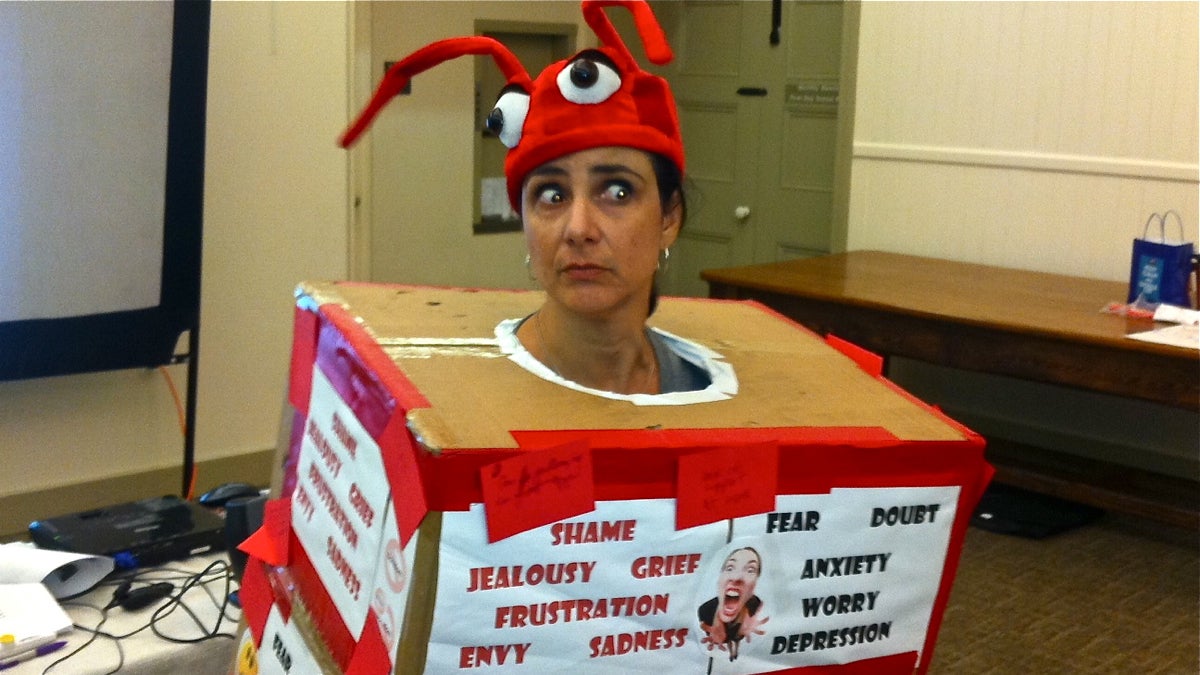Laughter as reset button for the brain
Listen
Christa Scalies is dressed up in a 'common stressors' costume, and is encouraging workshop participants to pelt her with marshmallows (Maiken Scott/WHYY)
Laughter is the best medicine. This old saying can sound really trite, especially to somebody who is struggling with depression, or suicidal thoughts. But a Delaware woman says laughter and humor should play a role in mental health treatment and she’s teaching workshops to demonstrate how it works.
Christa Scalies usually opens her workshop on “laughter therapy” with words about wellness and stress relief. But on this day, the news of Robin Williams’ suicide is too fresh to ignore. So she starts out with a dedication. “Let’s dedicate the laughter we’re going to create today to him, and to all the people who have struggled with this issue.”
About 40 people are gathered around tables at Philadelphia’s Friends Center, not quite sure what to expect. Many are mental health professionals, some are interested for personal reasons.
Scalies, whose day job is in finance, got interested in “laughter therapy” after struggling with depression ever since her teen years. “In retrospect, I’m not exactly sure how I made it through,” she recalled. “I remember being on my 30th birthday with my family, and I remember crying, and they said ‘what’s wrong?’ and I said ‘I never thought I’d live this long.'”
Suicidal thoughts were a constant companion during her years studying at Temple University, and working in the restaurant industry. “I spent an enormous amount of time, thinking about it, planning it, trying to just disappear.”
Scalies had a wake-up call when a close friend committed suicide in 2005. She had to clean out his house, and call his family and friends. “At that moment I realized there was no way I could do that to my family.”
Scalies began to pursue mental health by finding ways to cope with stress. As she learned more, received more training, she started teaching the things that helped her to her peers. She found that breathing exercises help, and so does intentional laughter.
“Laughter helps me switch gears, it’s like a control-alt-delete,” she said, referring to the keystrokes to reboot a Windows computer. “I’m not saying when you are laughing you won’t be depressed. Oftentimes when things are so bleak or so dark, if you can find the humor or laughter, it can help pull you back to reality, or at least provide a release valve.”
During her workshop, which she admits is downright silly at times, Scalies teaches participants breathing exercises and gets them to make laughing sounds. Everybody gets a kazoo and starts laughing into the little plastic instrument.
It may seem contrived at first, but soon everybody is cracking up and soon people are laughing too hard to blow into their kazoos.
A growing body of research documents the role of humor in mental health.
Scalies says particiants leave her workshops relaxed and with a more positive outlook. Her aproach is still novel in the mental health world, but she says therapists and providers are beginning to pay attention. Some are taking her message “giggle on” seriously.
WHYY is your source for fact-based, in-depth journalism and information. As a nonprofit organization, we rely on financial support from readers like you. Please give today.


